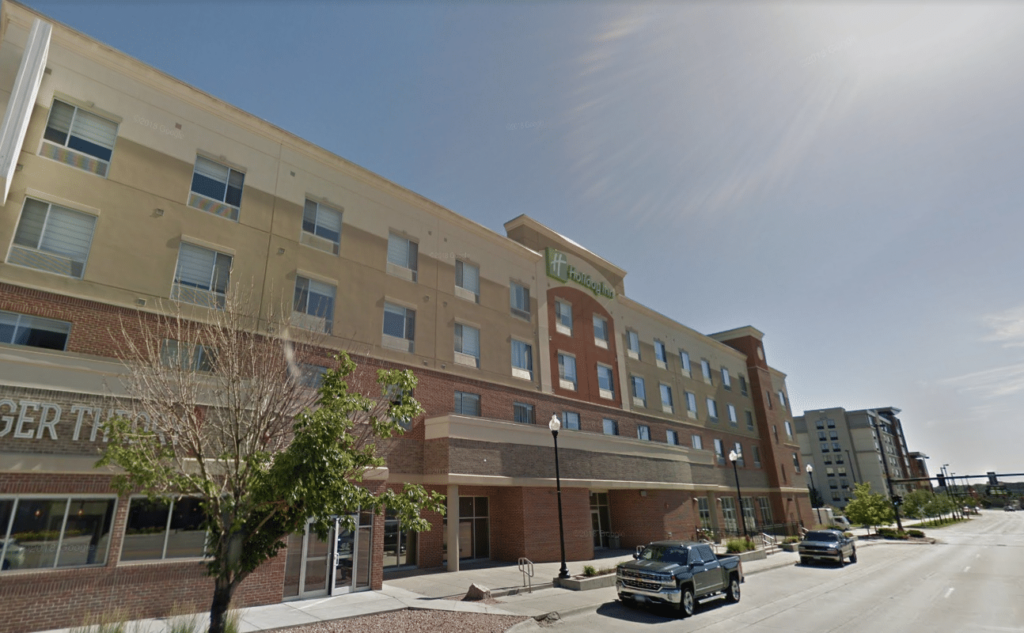New ‘Healthcare Travelers Take Omaha’ Conference Set For Early April

Travel healthcare professionals have said pursuing a travel career can be a lonely experience. Travelers are spread all across the country, which can make it difficult to connect with their colleagues outside of social media. So when the idea for a new travel healthcare conference came about during TravCon 2018, it wasn’t out of a desire to create a competing conference, but instead to provide another event where travelers can network and connect, travel nurse Thomas Piper said. “We wanted to provide people another option to supplement TravCon,” Piper said. “Not everyone can make it to Vegas every year in September, so this conference is another place where travelers can connect.” Piper is helping organize the new conference Healthcare Travelers Take Omaha, which is set to take place from 8 a.m. to 5 p.m. on April 5-6 at the Holiday Inn Omaha Downtown-Airport in Omaha, Nebraska. Tickets cost $50, which covers the cost of food provided during the conference, Piper said. Only 150 tickets will be sold and the number of travel company exhibitors for the event is capped at 30, Piper said. So far, around 20 percent of the tickets have been sold, but Piper said he expects that number to increase as travelers settle into their first contracts of the year and plan time off. As of Wednesday, 21 of the 30 exhibitor slots have been filled, according to the conference website. Piper’s traveler Facebook group Scrub Squad 1978 along with Gypsy Soul Travel Nurses and Adventures In RV Travel Nursing are the official hosts for the event, according to their website. Along with a keynote speaker, recruiter panel and CEO panel discussion, the conference plans to offer several learning sessions with industry professionals and special group events, including a charity golf tournament benefiting autism research, a 5K fun run/walk and a meet-and-greet mixer. The learning sessions will cover topics like traveler taxes, fitness on the road, breaking a contract, RV travel and housing, according to their website. Small setting, good conversation Part of the reason why Healthcare Travelers Take Omaha is only accepting a small number of travelers and exhibitors is out of necessity, Piper said. Planning for the conference began in April, so with only six months to pull the event together, venue options were fairly limited. Organizers also wanted to keep the cost of entry as low as possible for both attendees and exhibitors, which is why Omaha was selected for the first year of the conference, Piper said. “Omaha is a central hub for travel nursing companies,” Piper said. “It’s also centrally located, so it’s very inexpensive for travelers to access who may be on the edges of the country.” More than a dozen travel healthcare staffing companies call Omaha home, including Aureus Medical Group, Atlas Medstaff and Fusion Medical Staffing, all of which are exhibitors for the event. The conference won’t be held in Omaha every year, however. Another reason why organizers wanted a different conference was a chance to meet up with travelers in new places, Piper said. Organizers are already looking ahead to next year’s conference in Orlando where they plan to offer more tickets for travelers and space for exhibitors. “We’re travelers—we like to travel the country and don’t want to go to the same city every year,” Piper said. “TravCon is great and a lot of fun. I plan on going to it every year. But it can be expensive to visit Vegas every year if you’re working on the East Coast or want to bring your family along.” Another reason why organizers wanted a smaller setting was to offer more time for travelers and companies to network with each other, Piper said. “We’ve set a lot of time aside for people to have actual conversations with agencies and recruiters,” Piper said. “It’s definitely going to be a more intimate setting for networking and forming relationships.” Piper was encouraged by how quickly Healthcare Travelers Take Omaha has come together and hopes this conference will provide another great option for travelers to connect with each other, he said. “Talking after TravCon last year, we weren’t sure we would be able to throw it all together within six months, but it’s coming along nicely,” Piper said.
Nebraska Voters Approve Medicaid Expansion Ballot Initiative

Nebraska joined the likes of several other states who approved Medicaid expansion Tuesday, with more than 53 percent of the vote in favor with 90 percent of precincts reporting. As many as 90,000 newly eligible residents will gain coverage and the uninsured rate could fall from to 9.6% from 12.4% next year, according to an independent study by the Urban Institute. Along with the new Medicaid patients, the state will also see a cash flow of federal dollars—as much as $68 million annually—to help cover the program’s costs. The approval is a big win for advocates who have watched attempts to expand Medicaid fail six times in the state’s legislature. Advocates successfully petitioned and got the initiative added to the ballot in July. Voters also said yes despite heavy opposition from the Republican-controlled state representatives and Gov. Pete Ricketts, who saw it as a “government entitlement program.” Depending on when Nebraska’s Medicaid expansion program is officially implemented, the state could see a new wave of job opportunities in the travel healthcare market in 2019. Studies have shown that Medicaid expansion states have increased patient demands and healthier hospital budgets, which can lead to a higher volume of traveler needs. We will update this story with the final election totals when they are made available.
An Update On Medicaid Expansion Efforts and How They Affect Travelers

As we move closer and closer to November midterm elections in the U.S., healthcare access and quality issues have become a heated political battleground for legislators and citizens across the political spectrum. Medicaid expansion, a tentpole policy part of the Affordable Care Act passed in 2010, is one of the key divisive topics in this realm. It’s also something healthcare providers—and by extension travel healthcare professionals—are keeping an eye on, as expansion can have an impact on provider funding and patient care. What Is Medicaid Expansion? Under the Affordable Care Act, states can expand Medicaid eligibility to nonelderly adults with incomes at or below 138 percent of the federal poverty level, which equals about $16,700 a year for a single person and $34,600 for a family of four. Expansion states are funneled billions of dollars from the federal government to support expansion efforts and coverage for newly insured populations. In states that haven’t expanded, those adults fall into a “coverage gap” for having incomes above traditional Medicaid eligibility but below the limit to get approved for ACA marketplace premium tax credits. So far 34 states have approved Medicaid expansion, two states—Maine and Virginia—are in the works to implement expansions, and three states—Idaho, Utah and Nebraska—could potentially approve Medicaid expansion this year. Why is Medicaid expansion important to travelers? Simply put, hospitals in states that expand Medicaid can expect to see a new influx of patients looking for care on a regular basis which can affect seasonal staffing needs. A Commonwealth Fund study in 2015 found that 4 out of 10 primary care physicians who accepted Medicaid saw an increase in patients after expansion coverage took full effect. Additionally, studies have shown that hospitals in expansion states have much healthier budgets, which can leave more money on the table for hiring and retaining temporary or permanent staff. According to an analysis by the Kaiser Family Foundation, expansion hospitals saw “significantly improved hospital operating margins.” These factors don’t completely guarantee that facilities in expansion states will overflow with traveler needs, but it can help prevent razor-thin hospital budgets and get executives thinking about how to ease the burden on their permanent staff. What’s happening in states with plans for Medicaid expansion? Maine Medicaid was supposed to be available to newly eligible Maine residents on July 2, but a series of appeals and heated courtroom battles have kept expansion in limbo, leaving more than 70,000 without coverage. At the heart of the issue is Republican Gov. Paul LePage, who has vetoed Medicaid expansion efforts six times in office. Mainers approved Medicaid expansion through a referendum vote with a 59 percent voting majority in 2017, but LePage refuses to submit a plan to the federal government until sufficient state funding—under his terms—is found. LePage was ordered by a Superior Court justice to submit a plan in June, but his administration appealed the ruling to the Maine Supreme Court, saying they did not have to file a plan during the appeal process. Arguments for the appeal took place on July 18, but the court has yet to make a decision. You can view a more detailed timeline of the events leading up to the court hearing by clicking here. Idaho Advocates in Idaho successfully petitioned and gathered 75,314 verified signatures to add a Medicaid expansion measure to the ballot this November. The petition met both state requirements to qualify the ballot measure, gathering at least 56,192 verified signatures that represented at least 18 of Idaho’s 35 legislative districts, according to Ballotpedia. Utah Utah Gov. Gary Herbert signed a bill on March 27, 2018, for partial Medicaid expansion, directing the state to seek federal approval to expand Medicaid to 100% of the federal poverty level. The bill stipulated using the ACA enhanced federal match rate and adding a work requirement for the expansion population. To date, the Center for Medicare and Medicaid Services (CMS) has not approved waivers to access the match rate until Utah approves a full expansion. In the meantime, Utah expansion advocates garnered enough petition signatures to add a competing bill to November ballots that would approve a full expansion. Nebraska Similar to Idaho and Utah, Nebraska advocates have submitted a petition to add a Medicaid expansion initiative to the midterm election ballot this fall. Supporters filed more than 133,000 signatures on July 5, but the Secretary of State office is still verifying the signatures. At least 84,908, or more than 60 percent, of the signatures need to be valid for the initiative to make the ballot.
